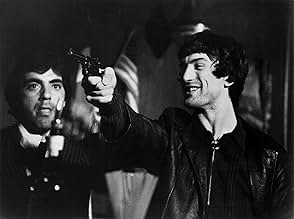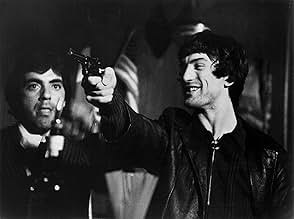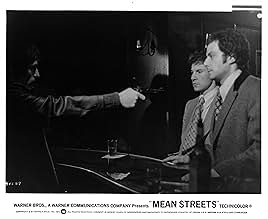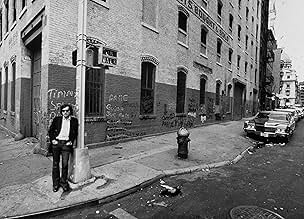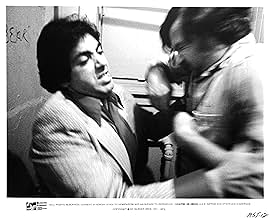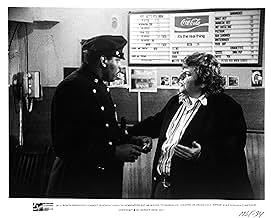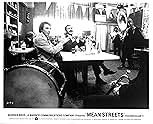Un matón de poca monta aspira a subir de rango en la mafia local.Un matón de poca monta aspira a subir de rango en la mafia local.Un matón de poca monta aspira a subir de rango en la mafia local.
- Dirección
- Guión
- Reparto principal
- Premios
- 5 premios y 5 nominaciones en total
Victor Argo
- Mario
- (as Vic Argo, Victor Argo)
Murray Moston
- Oscar
- (as Murray Mosten)
Reseñas destacadas
How can you endlessly watch a total screw-up borrow from the mob, annoy the only friend he has, and basically wreck his life without wanting to run away from it all? When the screw-up is played by young Robert DeNiro you are fascinated, you don't want to turn away. MEAN STREETS was not the debut of both Martin Scorcese or his stars Harvey Kietel and Robert deNiro. They struggled in the field for some time. This is the film that told the world, new head-honchos have arrived on the screen! MEAN STREETS tells of low-rent street hoods in Little Italy. Harvey Kietel plays the one hood whose a voice of reason, who doesn't mess up all the time, who is smart enough to avoid trouble. When DeNiro's Johnny Boy is first seen here, he is playing infantile tricks, and is telling his friend how he can't go in half the stores around him because he owes everybody money. Martin Scorcese uses a gritty documentary-shooting style to unfold his movie. It remains probably the best film of 1973 (But 1973 was not one of the best years for movies.)
Martin Scorsese has made some brilliant movies in his life, but unfortunately this isn't one of them. I can't really call it bad, because the direction and the cinematography just drip with pure talent, but I have some major problems with the plot. Mainly, where the hell is it? The story doesn't just move at a slow pace, it appears to go in incredibly tiring loops. It starts of with Johnny Boy (a solid Robert DeNiro) owing a whole bunch of crooks money, which is a pretty riveting starting point. What does he do about it? What do the crooks do about it? Nothing, and that goes on for two hours. The whole movie appears to be Harvey Keitel endlessly saying he has to pay his debts, to which he refuses, to which he asks it again half an hour later, to which he like, makes up an excuse and goes to the movies, and all of it feels so redundant. The movie finally gets to the point in the end, but that doesn't really save it. It shows the sadness of the bad neighbourhoods in New York wonderfully, but that's really all I can say about it.
Mean Streets has all the characteristics we have come to associate with Scorsese - the fluid camerawork, the expressionistic lighting, the sudden explosions of violence, the eclectic soundtrack. In later films, he took cinema to new heights with the flowering of his technical skills and the broadening of his material, but Mean Streets remains unsurpassed for the emotional intensity which only a young director, passionate about film and intent on making a personal statement, could achieve.
The theme of the film is contained in the famous first line 'You don't make up for your sins in church; you do it in the streets' (a Scorsese voice-over). An extended preface which delineates the nature of the film and its characters before the narrative begins includes brief cameo scenes introducing the four protagonists (a much copied device: see, for example, Trainspotting).
Scorsese's alter-ego is played as in the earlier 'Who's That Knocking At My Door?' by Harvey Keitel, giving the performance of his young life. He is Charlie, a junior member of a Mafia family who collects debts and runs numbers, but who also has aspirations to sainthood. The other key figure is his anarchic friend, Johnny Boy, played with ferocious energy by de Niro.
Charlie is introduced coming out of confession, dissatisfied with his penance. Reciting words doesn't mean anything to him and he can't believe that forgiveness could come so easily. Deliberately burning his hand in a candle flame is a more effective reminder of the pain of hell. The camera follows Charlie from the altar into Tony's bar, a red-lit inferno, and when Johnny Boy comes in, to the tune of Jumping Jack Flash, Charlie recognises that this is the form his penance will take. Johnny Boy is the cross he must bear. 'You send me this, Lord' he says resignedly.
Johnny Boy's irresponsibility and impulsiveness make him everything Charlie, with his controlled, anxious, guilt-ridden persona, is not. The argument which follows in the back room about Johnny Boy's debts deserves its reputation as one of the great scenes in seventies cinema.
Charlie's life moves in well worn, claustrophobic circles. Hardly anyone outside his immediate circle appears in the film and other ethnic groups are viewed with suspicion. The characters seldom appear outdoors or in daylight. Charlie inhabits a world of bars, pool halls and cinemas. In the one scene he appears in sunlight, he looks ill at ease. The suit and heavy overcoat he wears (reflecting his Mafiosi ambitions) look distinctly out of place on a beach. It's significant that in this scene Teresa, his girlfriend, scorns his small-time gangsterism and challenges him to join her in moving away to a new life. But Charlie is trapped by his desire to please his uncle.
Scorsese has said that his choice in adolescence lay between becoming a priest and becoming a gangster and that he failed on both counts. Mean Streets allows him to explore that choice to devastating effect.
The theme of the film is contained in the famous first line 'You don't make up for your sins in church; you do it in the streets' (a Scorsese voice-over). An extended preface which delineates the nature of the film and its characters before the narrative begins includes brief cameo scenes introducing the four protagonists (a much copied device: see, for example, Trainspotting).
Scorsese's alter-ego is played as in the earlier 'Who's That Knocking At My Door?' by Harvey Keitel, giving the performance of his young life. He is Charlie, a junior member of a Mafia family who collects debts and runs numbers, but who also has aspirations to sainthood. The other key figure is his anarchic friend, Johnny Boy, played with ferocious energy by de Niro.
Charlie is introduced coming out of confession, dissatisfied with his penance. Reciting words doesn't mean anything to him and he can't believe that forgiveness could come so easily. Deliberately burning his hand in a candle flame is a more effective reminder of the pain of hell. The camera follows Charlie from the altar into Tony's bar, a red-lit inferno, and when Johnny Boy comes in, to the tune of Jumping Jack Flash, Charlie recognises that this is the form his penance will take. Johnny Boy is the cross he must bear. 'You send me this, Lord' he says resignedly.
Johnny Boy's irresponsibility and impulsiveness make him everything Charlie, with his controlled, anxious, guilt-ridden persona, is not. The argument which follows in the back room about Johnny Boy's debts deserves its reputation as one of the great scenes in seventies cinema.
Charlie's life moves in well worn, claustrophobic circles. Hardly anyone outside his immediate circle appears in the film and other ethnic groups are viewed with suspicion. The characters seldom appear outdoors or in daylight. Charlie inhabits a world of bars, pool halls and cinemas. In the one scene he appears in sunlight, he looks ill at ease. The suit and heavy overcoat he wears (reflecting his Mafiosi ambitions) look distinctly out of place on a beach. It's significant that in this scene Teresa, his girlfriend, scorns his small-time gangsterism and challenges him to join her in moving away to a new life. But Charlie is trapped by his desire to please his uncle.
Scorsese has said that his choice in adolescence lay between becoming a priest and becoming a gangster and that he failed on both counts. Mean Streets allows him to explore that choice to devastating effect.
The first time that Robert De Niro appears up-close in Martin Scorsese's Mean Streets is to the tune of the Rolling Stones' Jumpin' Jack Flash. It's from this point forward that the movie leaves the realm of being a 'good film' and becomes 'one of the greatest films of all time.' Simply put, the energy of Mean Streets is fantastic. De Niro's flamboyant entrance is one of many iconic moments in the film, which has influenced just about every crime film made since for good reason.
And yet ironically Mean Streets is rarely acknowledged as the masterpiece that it is, perhaps because a number of people actually forget about it. Everyone remembers Taxi Driver, Raging Bull and GoodFellas in particular, but Scorsese's breakthrough remains one of his most important and honest pieces of work, given little recognition apart from the praise by movie critics who do remember it.
Harvey Keitel, giving one of his most realistic and three-dimensional performances of all-time, plays the lonely and worried Charlie, a 20-something New York City Catholic who is haunted by his friend, Johnny Boy (De Niro), the local loner who has to jump off the sides of streets in order to dodge the local Mafia thugs he owes money to.
Mean Streets has been accused of lacking a point, and one critic calls it 'too real,' but I'd take this over most recent films any day of the week. Mean Streets doesn't have a dynamic arc like most motion pictures do sure, there's the rising action leading up to the climax, but it doesn't move from one frame to another trying to figure out the easiest way to end the movie while managing to stress all its points in such a manner so blatant that a four-year-old could pick up the themes.
It respects its audience enough to study its characters in such a way that they are given ten times as much depth as those seen in modern films released through Hollywood. As Johnny Boy, De Niro paints the ultimate portrait of a typical street loner a dumb kid who 'borrows money from everyone and never pays them back.' Charlie, much smarter and wiser, takes Johnny under his wing and tries to help him get a job, so that he can pay back what he owes to a local kingpin. However, Johnny is so irresponsible and stupid that he doesn't show up for work and begins fighting with the mob leading up to an inescapable conclusion that features some very ancient themes colliding together. It's the classic tale of redemption and escaping one's past, and if the film has a point it is that some people can't change and you'll get what's coming to you, even if you've got other people helping you out.
The film does have its technical flaws, such as poor dubbing, inconsistency, and the occasional goof. It's a raw movie, filmed on a low budget by a young and far more naïve Martin Scorsese. But all his typical elements are in place, to be expanded upon later in his career.
Keitel and De Niro are superb, particularly De Niro who shows great range very early on in his career. Almost unrecognizable in shabby clothing, hats and a scrawny figure to boot, this is a role that would typically be more suitable for Christopher Walken or other charismatic character actors but De Niro pulls off the role with intense talent, proving once again that he can handle any type of role. He's known for his psychotic roles, but in Mean Streets, he plays the opposite of Travis Bickle. Johnny Boy isn't unstable or psychopathic he's just wild and stupid.
Keitel channels all the thoughtful consciousness of an older child, considering Johnny Boy to be a brother of sorts. He feels that if he fails Johnny, he will somehow fail himself.
Mean Streets is a careful character study that never resorts to cardboard cutout caricatures or the standard clichés of the genre. Dialogue does not exist to move action forward towards the next adrenaline-packed sequence; Mean Streets focuses on its inhabitants with such strong emotional power that it's impossible not to be caught up in its grasp. A true classic from start to finish, and undeniably a very moving film.
And yet ironically Mean Streets is rarely acknowledged as the masterpiece that it is, perhaps because a number of people actually forget about it. Everyone remembers Taxi Driver, Raging Bull and GoodFellas in particular, but Scorsese's breakthrough remains one of his most important and honest pieces of work, given little recognition apart from the praise by movie critics who do remember it.
Harvey Keitel, giving one of his most realistic and three-dimensional performances of all-time, plays the lonely and worried Charlie, a 20-something New York City Catholic who is haunted by his friend, Johnny Boy (De Niro), the local loner who has to jump off the sides of streets in order to dodge the local Mafia thugs he owes money to.
Mean Streets has been accused of lacking a point, and one critic calls it 'too real,' but I'd take this over most recent films any day of the week. Mean Streets doesn't have a dynamic arc like most motion pictures do sure, there's the rising action leading up to the climax, but it doesn't move from one frame to another trying to figure out the easiest way to end the movie while managing to stress all its points in such a manner so blatant that a four-year-old could pick up the themes.
It respects its audience enough to study its characters in such a way that they are given ten times as much depth as those seen in modern films released through Hollywood. As Johnny Boy, De Niro paints the ultimate portrait of a typical street loner a dumb kid who 'borrows money from everyone and never pays them back.' Charlie, much smarter and wiser, takes Johnny under his wing and tries to help him get a job, so that he can pay back what he owes to a local kingpin. However, Johnny is so irresponsible and stupid that he doesn't show up for work and begins fighting with the mob leading up to an inescapable conclusion that features some very ancient themes colliding together. It's the classic tale of redemption and escaping one's past, and if the film has a point it is that some people can't change and you'll get what's coming to you, even if you've got other people helping you out.
The film does have its technical flaws, such as poor dubbing, inconsistency, and the occasional goof. It's a raw movie, filmed on a low budget by a young and far more naïve Martin Scorsese. But all his typical elements are in place, to be expanded upon later in his career.
Keitel and De Niro are superb, particularly De Niro who shows great range very early on in his career. Almost unrecognizable in shabby clothing, hats and a scrawny figure to boot, this is a role that would typically be more suitable for Christopher Walken or other charismatic character actors but De Niro pulls off the role with intense talent, proving once again that he can handle any type of role. He's known for his psychotic roles, but in Mean Streets, he plays the opposite of Travis Bickle. Johnny Boy isn't unstable or psychopathic he's just wild and stupid.
Keitel channels all the thoughtful consciousness of an older child, considering Johnny Boy to be a brother of sorts. He feels that if he fails Johnny, he will somehow fail himself.
Mean Streets is a careful character study that never resorts to cardboard cutout caricatures or the standard clichés of the genre. Dialogue does not exist to move action forward towards the next adrenaline-packed sequence; Mean Streets focuses on its inhabitants with such strong emotional power that it's impossible not to be caught up in its grasp. A true classic from start to finish, and undeniably a very moving film.
Charlie may be small time but the authority and standing of his Uncle Giovanni in the community of Little Italy offers him the chance to become more than just a local hustler. One of the things he should be careful of is the company he keeps and who he stands with. Unfortunately Charlie is very protective of his cousin Johnny Boy, who seems determined to borrow as much money as possible, gamble it away and not pay it back and also in a relationship with Johnny's relation Teresa. While the fun and energy of the street life continues, dark consequences of all these things threaten Charlie and those around him.
It has been years since I saw this film and I noticed that I had last watched it before I started reviewing. As a result I watched it again yesterday to refresh my memory. Seeing it with older eyes is an impressive experience because I appreciate what Scorsese has gone on to do and found it fascinating to look back on this, one of his earliest films. The plot is a mash of characters and events that come together to create a sense of place that is convincingly done; the overall narrative focuses on Charlie, in particular where his relationships are taking him but this aspect ebbs and flows with the events. It is funny, violent, personal and engaging, only a few aspects come over as weak. The script flows like real dialogue, producing the different moods of each scene and also being memorable and rough.
The style and direction of the film are impressive and it is interesting to see the influence Scorsese had with this and his other films. The techniques employed here will ring bells with anyone who watches modern cinema and television with more than a passing interest, Sopranos in particular owes him a debt. Here we have the slow-motions, chest-mounted camera (I'm sure there is a proper name for it), impressive use of music and so on that we have come to be used to with Scorsese and one cannot help be impressed by how well developed these ideas were at an early stage in his career. Of course along with stylistic constants, several of the cast would become regulars. Keitel is the heart of the film for me and, although his opportunities in the script are surprisingly limited, I felt he did well with the themes handed to him. De Niro of course catches the eye more because of what was to come but also because he has the more energetic character. Robinson didn't make much of an impression on me but the support cast features early turns from faces such as Proval, Romanus, Argo and others.
Mean Streets might be a bit rough and ready when placed next to the polished films that Scorsese would go on to do but it does not take away from its strengths to look back at it. So much of Scorsese's style and calling cards are in place even at this early stage and his film convincingly creates the streets and characters of the place. The main players involved have done better films since this one but it is still strong, stylish and interesting and definitely worth a look for anyone who has since any other Scorsese films.
It has been years since I saw this film and I noticed that I had last watched it before I started reviewing. As a result I watched it again yesterday to refresh my memory. Seeing it with older eyes is an impressive experience because I appreciate what Scorsese has gone on to do and found it fascinating to look back on this, one of his earliest films. The plot is a mash of characters and events that come together to create a sense of place that is convincingly done; the overall narrative focuses on Charlie, in particular where his relationships are taking him but this aspect ebbs and flows with the events. It is funny, violent, personal and engaging, only a few aspects come over as weak. The script flows like real dialogue, producing the different moods of each scene and also being memorable and rough.
The style and direction of the film are impressive and it is interesting to see the influence Scorsese had with this and his other films. The techniques employed here will ring bells with anyone who watches modern cinema and television with more than a passing interest, Sopranos in particular owes him a debt. Here we have the slow-motions, chest-mounted camera (I'm sure there is a proper name for it), impressive use of music and so on that we have come to be used to with Scorsese and one cannot help be impressed by how well developed these ideas were at an early stage in his career. Of course along with stylistic constants, several of the cast would become regulars. Keitel is the heart of the film for me and, although his opportunities in the script are surprisingly limited, I felt he did well with the themes handed to him. De Niro of course catches the eye more because of what was to come but also because he has the more energetic character. Robinson didn't make much of an impression on me but the support cast features early turns from faces such as Proval, Romanus, Argo and others.
Mean Streets might be a bit rough and ready when placed next to the polished films that Scorsese would go on to do but it does not take away from its strengths to look back at it. So much of Scorsese's style and calling cards are in place even at this early stage and his film convincingly creates the streets and characters of the place. The main players involved have done better films since this one but it is still strong, stylish and interesting and definitely worth a look for anyone who has since any other Scorsese films.
What Scorsese Film Ranks Highest on IMDb?
What Scorsese Film Ranks Highest on IMDb?
Cinema legend Martin Scorsese has directed some of the most acclaimed films of all time. See how IMDb users rank all of his feature films as director.
¿Sabías que...?
- CuriosidadesFrancis Ford Coppola contributed money to the budget of the film. However, it is rumored that he lent Martin Scorsese $3000 as the Mafia shook him down for using the San Genaro Festival as a backdrop without "permission". It's generally presumed the Mafia uses the all-cash festival to launder money from their ill-gotten gains.
- PifiasYou can see Robert De Niro's mic pack on his back when he gets up to walk to the window at Charlie's house after staying the night.
- Citas
[first lines]
Voice in Charlie's Mind: You don't make up for your sins in church. You do it in the streets. You do it at home. The rest is bullshit, and you know it.
- Versiones alternativasNBC edited 10 minutes from this film for its 1977 network television premiere.
- ConexionesEdited into American Cinema: Film Noir (1995)
- Banda sonoraJumpin' Jack Flash
Written by Mick Jagger (as M. Jagger), Keith Richards (as K. Richards) (uncredited)
By The Rolling Stones
Courtesy of ABKCO Records
Selecciones populares
Inicia sesión para calificar y añadir a tu lista para recibir recomendaciones personalizadas
- How long is Mean Streets?Con tecnología de Alexa
Detalles
- Fecha de lanzamiento
- País de origen
- Sitio oficial
- Idiomas
- Títulos en diferentes países
- Mals carrers
- Localizaciones del rodaje
- Empresas productoras
- Ver más compañías en los créditos en IMDbPro
Taquilla
- Presupuesto
- 500.000 US$ (estimación)
- Recaudación en Estados Unidos y Canadá
- 32.645 US$
- Fin de semana de estreno en EE. UU. y Canadá
- 32.645 US$
- 15 mar 1998
- Recaudación en todo el mundo
- 61.676 US$
- Duración1 hora 52 minutos
- Color
- Relación de aspecto
- 1.85 : 1
Contribuir a esta página
Sugerir un cambio o añadir el contenido que falta





